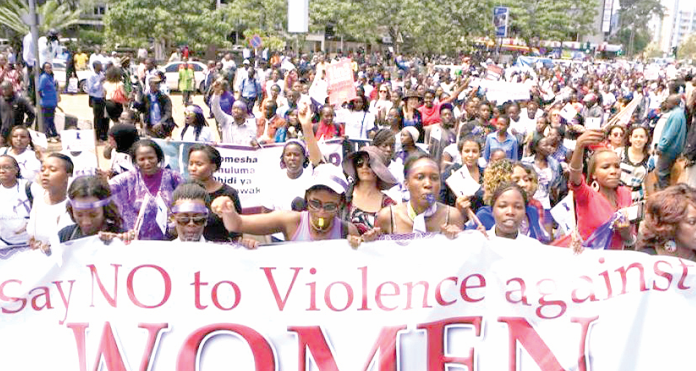Femicide: Why men fail to condemn misogyny

Hours before a nationwide march in Kenya against the rising cases of femicide and other violence against women – a clip was posted on social media that captures how entrenched misogyny is in Kenya.
At a site in the capital, Nairobi, where some young women were gathering for the protest last weekend, two men were filmed arguing about the need for such a demonstration.
“Men have suffered because of women,” one of them complains going on to say that in his view women just use men for their money.
As the heated discussion continues, his companion butts in and they both start pointing towards the camera and shouting to the women: “We are going to kill you.”
This snippet was shared by renowned Kenyan activist Boniface Mwangi along with the words: “As a man and father, these men don’t speak for the men I know.”
But the problem, as he notes, is that very few men in Kenya are openly coming out to speak out against such attitudes.
“We as Kenyan men should speak boldly, and loudly,” he said about femicide, which is when a woman is killed because of her gender.
It is a sentiment shared by Felix Kiprono, head of media at data analysis and visualisation company Odipo Dev.
Reported murders
He and his colleagues recently released a report about Kenya’s alarming rise in female killings – the country is reeling from at least 10 reported murders of women in the first month of the year alone.
One gruesome killing involved a victim whose dismembered remains were found stuffed into a plastic bag at a short-term rental apartment.
Titled Silencing Women, he says the report “aims to shed light on the disturbing reality of women’s lives at risk, providing crucial information to address victim blaming, under-reporting and to inspire meaningful action”.
But Kiprono has been appalled by the reaction to its findings, in particular on social media which is sometimes described in Kenya as a “manosphere” – a network of online platforms focusing on the promotion of masculinity and opposed to feminism.
He told the BBC the blowback had been across all platforms: “Not just on Twitter but even on TikTok, which is typically known as a safe space.”
Media interviews
With the report now in the public domain, he and his team have been getting many requests for media interviews.
“Apparently, it’s difficult to get men to agree to talk about this matter publicly,” he said.
Another aspect to the reactions is that men have shown little inclination to become involved in discussions online on the issues the report highlights.
“As we were looking at the analytics, we were realising, particularly on Instagram and TikTok, that about 90% of the people that were engaging are women,” Kiprono said.
“There seems to be a huge disparity in the male versus female attitudes towards gender-based violence in general.”
One man who has chosen to speak out is Kenyan DJ, podcaster and TV host Moses Mathenge, popularly known as “DJ Moz”.
Two weeks ago, he was one of the first to castigate femicide, posting a lengthy video on his social media platforms, along with the words: “Femicide This needs to STOP.
“We have lost too many women (wives, mothers, daughters, sisters, friends, children) to this monstrous act of violence.”
He says it took his colleague, podcast producer Kate Wangila, to get him to take a stance.
“Because of a rising number of femicide cases, she was like: ‘Moz, you need to do something about this.’ And I’m glad that she nudged me,” he said.
DJ Moz decided to go a step further and investigate the global statistics on femicide – and what he found shocked him.
“You know the crazy thing – Africa has the highest number of femicide cases in the world. Those are not things that we should be proud of as Africans,” he said.











